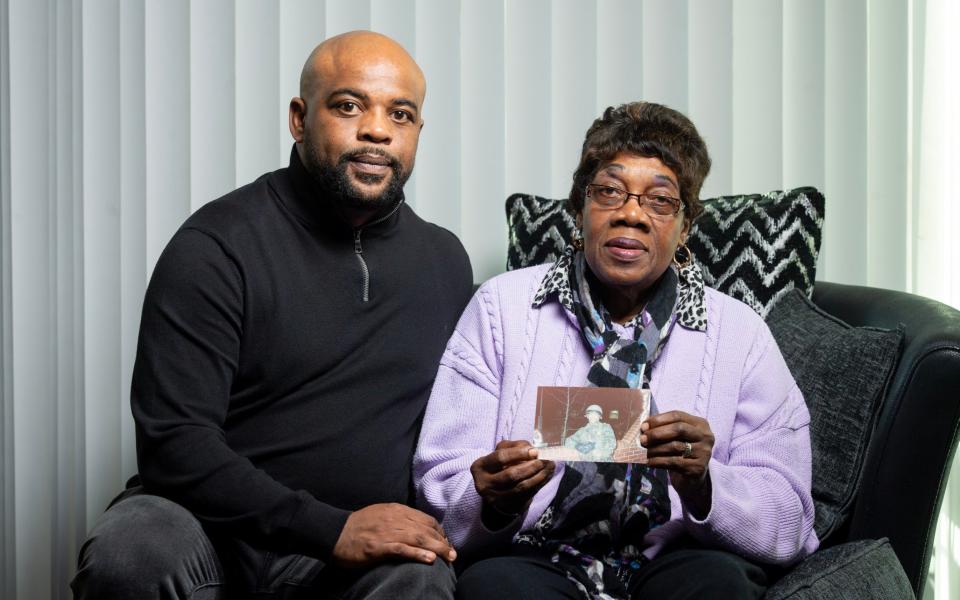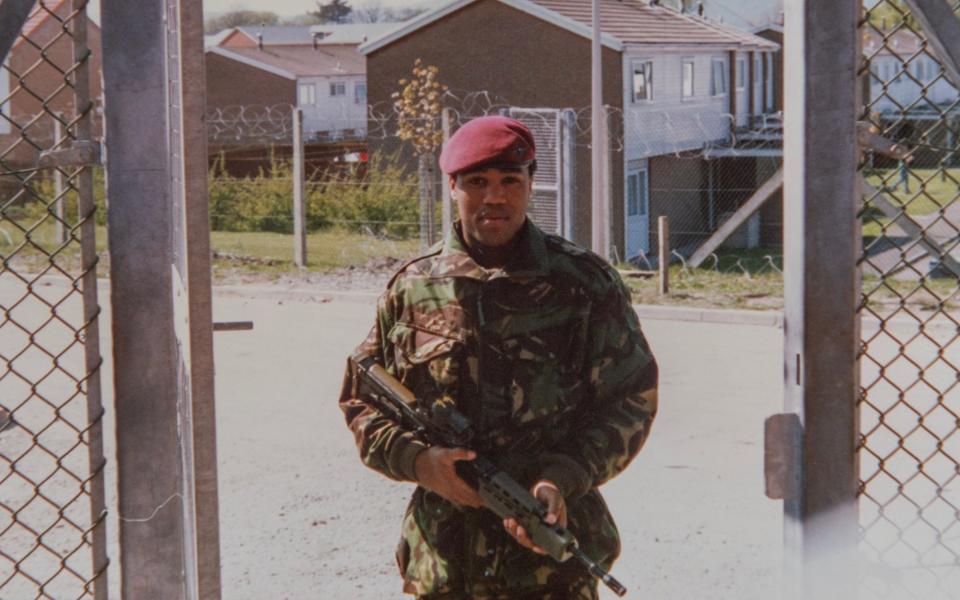'We're just viewed as collateral damage:' Family of British soldier murdered by IRA demand justice

When Private Tony Harrison returned to Northern Ireland in the summer of 1991, having been visiting his family in London, the 21-year-old should have been planning his wedding with his fiancée.
Instead, Private Harrison, who was serving with Third Battalion, the Parachute Regiment, was shot in the back five times while sitting on the sofa watching an episode of the Fresh Prince of Bel-Air at his fiancée's home in east Belfast.
His murder at the hands of two IRA members destroyed his family overnight.
“Our entire world was shattered,” Private Harrison’s elderly mother, Martha Seaman, told The Telegraph.
After three decades, Private Harrison’s mother and younger brother Andy Seaman have broken their silence to criticise the Government’s proposed Northern Ireland Troubles (Legacy and Reconciliation) Bill over the effective immunity it will provide for terror suspects who co-operate with authorities.
They said they had been made to feel that Ben Wallace, the Defence Secretary, viewed families like theirs as “collateral damage” and an “inconvenient truth”.
Mr Wallace has previously given his backing to the Bill on the “condition” that “the statute of limitations only applies to those individuals who engage in the process”.
However the Seamans argue that the very notion that the perpetrators will be protected if they “engage in the process” is nothing short of “double standards”.

“This Bill appears to be a poorly conceived, cynical piece of legislation determined solely to sweep the mistakes made by the British military in Northern Ireland under the rug,” Mr Seaman said. “What it’s failing to take into account is the hundreds of families like us, both military and civilian, that will receive very little by way of closure or justice, if this Bill is passed.”
He added that the Bill, which he has said should be scrapped, “seeks to kick any hope we have for justice into the long grass”.
Last week Mr Seaman, together with the family of Majella O’Hare, a 12-year-old girl who was killed by two shots fired from a British soldier as she made her way to church, wrote to the Prime Minister urging him to throw out the Bill.
The two families acknowledged that in joining forces to co-sign this letter “many might think we would be on opposite sides of this debate”, but warned that the proposal “protects the perpetrators of serious crimes rather than those who suffered at their hands”.
Mr Seaman was 13 years old when he lost his brother on June 19, 1991, a date that is “etched in our minds”. At 44-years-of age he and his 79-year-old ailing mother are both “angry” and “disillusioned” that after all this time they still have no answers as to who killed Tony.

In a letter to the family in 2015, written by then Armed Forces minister Penny Mordaunt, she acknowledged that Private Harrison’s “killers have never been brought to justice”.
Noel Thompson, a taxi driver, was jailed for 12 years in 1993 for conspiring to murder over the case. He had picked up Private Harrison at Belfast airport on his return from England and reported it to a man he believed to be in the IRA. To date, the men who burst into his fiancée's home and shot him have not been found.
“On a purely human level I feel like our rights have been violated,” Mr Seaman said. “The right to a fair trial should apply to victims of the crime as well as the perpetrators of said crime. Our right to a fair trial, our right to justice, to life, has been completely shattered.”
Mr Seaman said his “message to Ben Wallace is that we should not be viewed as collateral damage... we should not be viewed as an inconvenient truth".
He added: “I’d like to know if he is comfortable with the fact the men involved in Tony's murder are free?”
But it is the cruel loss of her boy, who they describe as “absolutely fearless”, that Ms Seaman still feels so acutely – a young man who was “obsessed” with the military from a young age, where he devoured “books and films about the SAS”, having joined the Cadets in secondary school and “never looked back.”
He was inspired to join the Army by his father, Steven, and had aspirations of one day making it to the SAS, having already made it on to the elite Pathfinders unit. His mother said getting his “wings” with the Parachute Regiment was “the highlight of his life”.
However, consumed with guilt for encouraging his son to follow him into the military, Ms Seaman's husband drink himself to death. Struggling to care for him as he battled with alcoholism, while raising her other child and coping with her own grief, has taken its toll on Ms Seaman's health, which she believes has worsened with the heartache she has endured.
“I don’t feel I’ll get the answers in my lifetime,” she said. “Not only that, but what has happened to our family? Tony was planning to get married, that didn’t happen. My life has been shattered from that time onwards.”
'Peace at any cost'
Ms Seaman accused the Government of “looking for peace in Northern Ireland at any cost”. “When it comes to the families finding some answers, they are swept under the carpet,” she said.
The family “feel let down” by the Ministry of Defence, the former Royal Ulster Constabulary and the Police Ombudsman of Northern Ireland. Their wish is also for the ombudsman to be given the appropriate resources to properly investigate the Troubles’ murders, but they have been repeatedly told in letters from that they “don’t have the resources, we rely on central government for funding, we haven’t got the funding, we haven’t got the people, we have hundreds and hundreds of cases …funding is always the problem”.
An NIO spokesman said: “The Northern Ireland Troubles (Legacy and Reconciliation) Bill seeks to ensure that the process for dealing with the past focuses on measures that can deliver positive outcomes for as many people directly affected by the Troubles as possible.
"This Bill will seek to strike the right balance between a clear focus on information recovery, while ensuring that those who choose not to reveal what they know remain indefinitely liable to the threat of prosecution, should evidence exist or come to light.
"We know that the Bill remains challenging for many, and we remain committed to further constructive engagement as the Bill continues its passage through Parliament."
For Mr Seaman, it has become his personal ambition to try to the utmost to ensure that his older brother’s death was not in vain.
“Tony was an extraordinary young man and he has laid in a cold corner of a cemetery in east London for over three decades,” he said. “His memory deserves to be honoured better than this.”

 Yahoo Sport
Yahoo Sport 





































